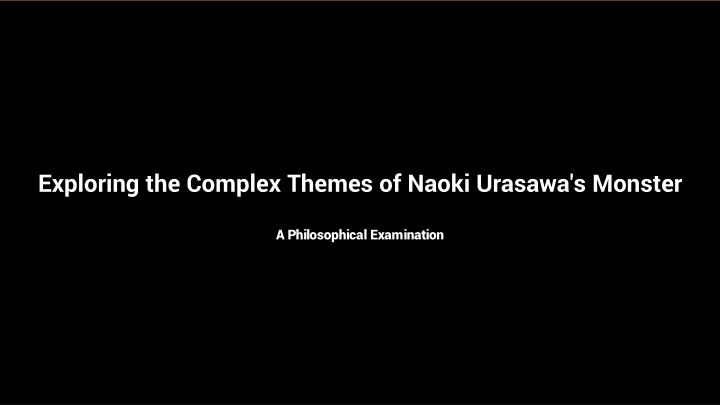
Unraveling Naoki Urasawa's "Monster": A Philosophical Analysis
Delve into the intricate moral dilemmas, philosophical conundrums, and character dynamics within Naoki Urasawa's "Monster." Explore the dichotomy between Dr. Tenma and Johan Liebert, the influence of Nietzsche and Kant, the enigmatic side characters, the climactic Ruhenheim arc, and the final philosophical standoff, all set against a post-World War II German backdrop. Witness the clash of ideologies and the exploration of human nature in this masterful storytelling canvas.
Download Presentation

Please find below an Image/Link to download the presentation.
The content on the website is provided AS IS for your information and personal use only. It may not be sold, licensed, or shared on other websites without obtaining consent from the author. If you encounter any issues during the download, it is possible that the publisher has removed the file from their server.
You are allowed to download the files provided on this website for personal or commercial use, subject to the condition that they are used lawfully. All files are the property of their respective owners.
The content on the website is provided AS IS for your information and personal use only. It may not be sold, licensed, or shared on other websites without obtaining consent from the author.
E N D
Presentation Transcript
Exploring the Complex Themes of Naoki Urasawa's Monster A Philosophical Examination
Introduction Naoki Urasawa's Monster: A masterpiece in storytelling Rarely given the adoration it deserves Examining moral codes and their fragility Exploring philosophical conundrums and allegories An intriguing fascist, post-World War 2 German German setting Photo by Pexels Photo by Pexels
The Dichotomy Between Dr. Tenma and Johan Liebert Dr. Tenma: The good, human-loving doctor Johan Liebert: The abyssal nihilist Clashing moral philosophies - deontology vs. nihilism The moral responsibility of saving one life over another The tug of war between their ideologies Photo by Pexels Photo by Pexels
The Influence of Nietzsche and Kant Nietzsche's concept of the ubermensch Johan as a quasi-ubermensch and the limitations of his ideology Tenma's adherence to deontology and the value of human life The tension between self-preservation and moral principles Impact of Nietzsche and Kant's philosophies on the narrative Photo by Pexels Photo by Pexels
Exploring Side Characters Roberto: The devoted follower, seeking nihilism nihilism Wolfgang Grimmer: Blind-faith and the loss of emotion Dieter: Apostles and ideological growth Heinrich Lunge: From egoist to panoramic wisdom The significance of each character's philosophy Photo by Pexels Photo by Pexels
The Climactic Ruhenheim Arc Ruhenheim as a thematic and narrative focal point Franz Bonaparta and his dark experiments The philosophical battlefield of a small mountain town The culmination of violence and ideologies The mysterious landscape for a doomsday Photo by Pexels Photo by Pexels
The Final Philosophical Standoff Tenma's internal struggle and moral doubts The ultimate trolley problem The primal instincts of self-preservation Johan's envisioned perfect suicide The open-ended conclusion and differing interpretations Photo by Pexels Photo by Pexels
